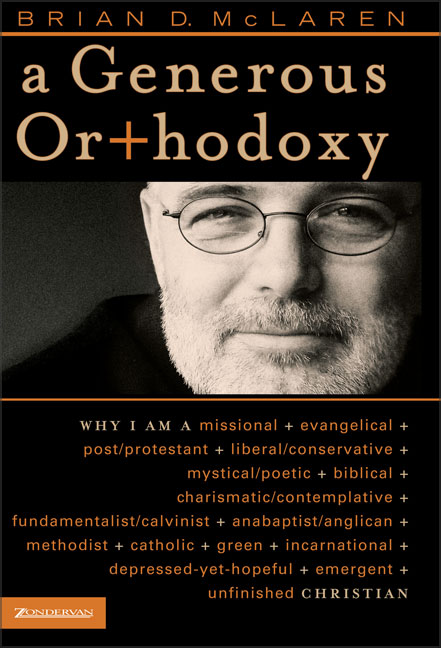"The Bible says that polygamy is okay, but you say it's wrong. The Bible says that slavery is good—do you think we should enslave people? The Bible commands genocide too. No one—not even you—agrees with everything that the Bible says is right, so how can you insist on what it says is wrong?"
Does the Bible have no credibility because of evil behavior that it endorses?
I believe that very few people who think it through would answer "yes" to that question, because the people who are the most critical of what the Bible says draw their critiques from other stuff that the Bible says.
For example, some people blast away at the Bible for being misogynistic and enshrining the patriarchy (fancy ways of saying, "It hates women"). But the basis of that critique is the premise that people in power ought to yield power willingly to those who do not have it on the basis of a common humanity. Whence comes that principle? The Bible, of course. (It is not for nothing that feminism emerged out of once-Christianized places; in other civilizations it grows as a transplant.)
So the Bible has at least some credibility, because it promotes some things we think are good. On some issues, in fact, it contains the only ancient material that promotes what we think is good. Nevertheless, there remains this terrible discomfort over bad stuff that the Bible (apparently) tells people to do. That inclines people to believe that it is up to us wise moderns to sort out what is legit and not legit in the Bible's teaching.
But there is a problem here: people who make that claim often don't know what the Bible says themselves—they haven't actually read it but are just going on what other people have told them about it. And even those who have seen for themselves what the Bible says are often careless about what exactly it says, what it does not say, how it says what it says, and why.
Here are two principles to operate by when you find what looks like an endorsement of bad behavior in the Bible.
Principle #1 – Commands matter more than allowances
Very often, when people say, "The Bible says we should do _____________," the Bible is merely describing a practice, not commending it. And sometimes when the Bible does contain some law about a bad practice, it is still not commending it. Rather, it is providing guidelines and limitations to ameliorate the bad thing going on in a society for the time being.
The clearest example of this phenomenon is divorce:
Then some Pharisees came [to Jesus], and to test him they asked, "Is it lawful for a man to divorce his wife?" He answered them, "What did Moses command you?" They said, "Moses permitted a man to write a certificate of dismissal and to divorce her" [Deut. 24:1]. But Jesus said to them, "He wrote this commandment for you because of your hard hearts. But from the beginning of creation [God] made them male and female [Gen. 1:27]. For this reason a man will leave his father and mother, and the two will become one flesh [Gen. 2:24]. So they are no longer two, but one flesh. Therefore what God has joined together, let no one separate" [Mark 10:2-9].Jesus and the Pharisees are debating what is right and wrong behavior according to the Law, as observant Jews have been doing for two and a half millennia. Jesus asserts that the "commandment" God gave through Moses about divorce was only to manage the destructiveness of an undesirable, sinful situation ("your hard hearts"). In other words, divorce was allowed but was not truly commanded. The true command—the original intention of God, to be adhered to by all who would please him—is not to divorce at all, except possibly in cases of sexual infidelity.
Polygamy is a similar example. God's intention for humans at creation excludes polygamy for the same reason that it excludes divorce. Yet God allowed that situation to exist for a while without prohibiting it. Nevertheless, every polygamous family described in the Bible is wracked with strife, the natural result of departing from God's desire.
Slavery, though a more complex issue, follows a similar pattern. Only in rare and specific historical circumstances (which we will examine below) did God command people in the Bible to enslave other people. Otherwise, God (through Moses and the apostles) regulated slavery as a given in the societies and economies that his people lived in. In Israel he laid down law that gave considerable rights and protections for most slaves, especially in comparison with neighboring nations. In the church scattered in the Roman Empire he gave instructions about masters' treatment of and attitude toward their slaves. In both cases, God's commands, though not abolishing slavery, went a long way toward humanizing it if they were obeyed.
This "humanizing" is a very important point, because slavery is undergirded by the idea that a slave is something like a domesticated animal, occupying a place between a full human and an inanimate tool. Any requirement that the slave be treated as a fellow human being attacks the institution at its foundation. When Paul instructed Philemon to treat his runaway slave, Onesimus, as a "brother" because both were in Christ, he may as well have abolished slavery itself. If Philemon as a Christian desired the salvation of all people, including his slaves, and if he were to treat those slaves as full-blooded family members, then the accouterments of slavery, followed by its obligations and then its very structure, would wither away in his household and in all Christian households who lived according to the same principles.
This is in accordance with God's desire to see slavery abolished, a theme that runs through the Bible. The foundational narrative of Israel was the story of God setting a slave people free, redeeming them to be his own servants. This remained the hope spoken by the prophets while Israel was stuck in a sort of national slavery to foreign powers as tributaries and as captives. In the New Testament, Jesus reaffirmed this hope for Israel, and he and the apostles added a layer of meaning to liberation: namely, salvation is pictured as liberation from slavery to one's own guilt, one's propensity to sin, and the death stemming from both.
So it is important to distinguish between what the Bible commands and what it allows and regulates, and looking at God's overarching intentions expressed in creation and new creation (redemption) helps us to distinguish between commands and allowances. That sets up the second principle . . .
Principle #2 – Reasons matter more than commands
When viewing an endorsement of any behavior in the Bible, good or (apparently) bad, it is important to understand as well as possible why that command is there. This has been an implicit theme throughout this series of posts, but it is especially important when looking at commands that appear to us to be immoral.
Sometimes the reasons God issues a command reveal that the command is specific to one situation, which must be considered on its own terms. The prime example of this is genocide.
For starters, let's get clear exactly what we're talking about. Some people have the impression that ancient Israelites committed genocide willy-nilly and that, according to the Bible, God commanded all of it. This is not so. Israel fought many wars over eight hundred years, but God only commanded genocide in situations that pertained to Israel's travel to and possession of the land God promised to Israel's ancestor Abraham. Moreover, even in those situations the massacre was not always total. In a few cases, everyone died. Other times girls, or all women and children, were left alive, and these were enslaved.
Incidentally, massacre and enslavement were standard procedure when a resistant city fell to a besieger in the ancient world. Nevertheless, this is a terrible, dreadful thing, and I do not mean to minimize it. Yet it is important that we look at the reasons. Why did God command the extermination of certain peoples root and branch?
The first reason is that they deserved it. Before you tune this out, hear me out. People who lived in Canaan (modern Israel/Palestine) were well known for their atrocious customs, including burning babies alive as sacrifices to their gods. These were not gentle, harmless people.
Nevertheless, you and I deserve the same fate. The just punishment for any sin of any sort is death. God does not owe us a single moment of life; to the contrary, every breath he allows us is pure mercy as he patiently gives us time to turn from our wicked ways. The real mystery isn't why God decreed the extermination of the Canaanites but why he hasn't yet executed the same judgment on us all.
The second reason for the genocide God commanded is that he knew what would happen to Israel if the Israelites did not eliminate those cultures. He repeatedly warned that if they lived peaceably among the Canaanites together in the same land they would adopt reprehensible Canaanite practices, especially worshiping something other than him—which, to repeat, is the big sin that all of us commit one way or another. In fact, Israel did not completely annihilate the Canaanites, and what God warned is exactly what happened with horrific consequences for Israel.
Third, God's command to Israel is a critical admonition to us, although, as I wrote previously about the Law of Moses in general, we apply these directions to the inward parts of our lives, not to our physical circumstances. Israel was God's physical kingdom, but believers in Christ are citizens of an invisible (for now) and spiritual kingdom. Israel had physical adversaries, but believers in Christ have spiritual adversaries—namely, the devil and the evil embedded in our corrupt selves. But just as Israelites were to take no prisoners of the enemies that could lead them astray, so we are to take no prisoners and make no peace with the influences toward evil in our selves, our surroundings that we can control, and Satan. As John Owen wrote three and a half centuries ago, "Be killing sin, or it will be killing you."
It is noteworthy that God did not command Israel to annihilate its other pagan neighbors even when they fought with Israel. Instead, Israel was to be rigorously pure in its own space in order to lead its wayward neighbors to the truth for their own good. Likewise, our ruthless battle is against impurity within our own selves so that the people around us, even if they hate us, might be led to truth and life.
Therefore, even though God commanded genocide only in a narrowly specific situation, his reasons for that command are universally applicable.
Sometimes, however, with other issues, reasons given in the Bible reveal that a command is for all places and times.
Let's take what Paul the Apostle says about homosexual behavior, for example. In Romans 1:18-32, Paul argues that God repaid humans' universal inclination toward idolatry of one kind or another—despite evidence from nature that he is the Creator—by "giving them over" to foolish thinking, which they consider wise, and wicked behavior, which they justify to themselves. Paul cites homosexuality as the prime example of this degradation.
Some people today want to maintain respect for the Bible as God's Word and at the same time go with society's beliefs about homosexuality. They point out that male homosexual affairs in ancient Greece and Rome were usually what we would call pedophilia—an adult man with an adolescent boy. This, they claim, is a very different thing than two loving, committed male adults today.
Setting aside the issue of how many male homosexual liaisons today happen between two loving, committed, exclusive, lifelong partners (it is a minority), Paul and other biblical authors never condemn homosexual behavior for being pedophilia or for being promiscuous. Paul condemns it because it comes from a flat denial of the God who created human beings in his image, male and female. He condemns it because human beings flipped the script and made their god-concepts in human image, and that inversion is reflected in their perversion. Reasons matter more than commands, and these reasons apply no matter how, where, or when homosexuality is practiced. Besides, ancient lesbianism was not pedophilia, but Paul denounces it too.
In response, some readers note all the bad behaviors Paul attributes to these homosexual idolaters: "every kind of unrighteousness, wickedness, covetousness, malice . . . envy, murder, strife, deceit, hostility," and so forth (v. 29). They say, "Hey, if I knew a gay person who was like that, I'd call him an evil person too! But the Bible isn't judging a gay person who is good; it's only judging a gay person (or any person) like those people."
To this I say, quite right: the Bible is only judging people like that, gay and straight alike. But all people are like that, so all deserve to be judged. Paul continues, "Therefore you are without excuse, whoever you are, when you judge someone else. For on whatever grounds you judge another, you condemn yourself, because you who judge practice the same things" (2:1). "There is no one righteous, not even one. . . . All have turned away, together they have become worthless. . . . There is no fear of God before their eyes. . . . No one is declared righteous before him by the works of the law" (3:10, 12, 18, 20).
Exemption from judgment only comes by receiving the merciful grace of God offered in Jesus Christ, a grace that "trains us to reject godless ways and worldly desires and to live self-controlled, upright, and godly lives in the present age. . . . He gave himself for us to set us free from every kind of lawlessness and to purify for himself a people who are truly his, who are eager to do good" (Tit. 2:12, 14).
The Bible does not call homosexual behavior a bad thing because it is associated with other behaviors any more than it calls stealing wrong because it is associated with lying or murder wrong because it is associated with pride. Reasons matter more than commands, and the reason the Bible gives is that homosexual behavior denies and defaces God's image in humanity, male and female. His grace does not bid us to get clean in all parts of our lives except our sexuality but rather to act holiness out in all aspects of our being.














.jpg)






